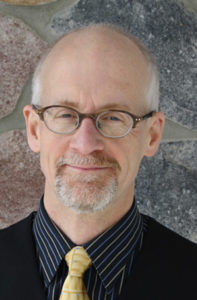 Dan Schrock works as a pastor at Berkey Avenue Mennonite Fellowship, Goshen, Indiana, teaches courses in spiritual direction and prayer at Anabaptist Mennonite Biblical Seminary, Elkhart, Indiana, and offers spiritual direction. Dan is a member of the Mennonite Spiritual Directors Network.
Dan Schrock works as a pastor at Berkey Avenue Mennonite Fellowship, Goshen, Indiana, teaches courses in spiritual direction and prayer at Anabaptist Mennonite Biblical Seminary, Elkhart, Indiana, and offers spiritual direction. Dan is a member of the Mennonite Spiritual Directors Network.
In my roles as a pastor, seminary teacher, and spiritual director, I sometimes work with people who have an apophatic spirituality. A good way to understand an apophatic spirituality is by contrasting it to a kataphatic spirituality.
Most Christians have a kataphatic spirituality which uses tangible things to help us understand and experience God. A kataphatic spirituality employs words, images, sounds, symbols and ideas to express what God is. We might say that “God is love” or “God is passionate about the poor” or “God is always and everywhere present.” Many practices feed the kataphatic path such as singing, preaching and teaching, petition/intercession/thanksgiving, liturgy, Bible study, and service.
Fewer Christians have an apophatic spirituality, which explores the ineffable reality of God which lies beyond our ordinary comprehension.In the apophatic mode, we express what God is not. We say things like “God is not subject to death” or “God is not Anglo, African, Asian, or Latino” or “God is not finite.”
The Jewish theologian Martin Buber called God “the essential mystery,” “the unknowable,” and “the paradox of paradoxes.” Apophatic spiritualities use words, images, sounds and symbols as sparsely as possible. Practices for the apophatic path include centering prayer, fasting (“giving up something for Lent”), unknowing, silence, solitude, relinquishment and humility. People living with an apophatic spirituality may experience dereliction, a dark night, inward or outward poverty, an inner desert, suffering, or some type of crucifixion. When Jesus remarks that those who lose their lives for his sake will find it, he’s describing an apophatic approach to spirituality (Luke 9:24).
Not many people have a purely apophatic spirituality throughout life. More commonly we may pass through a season of life where our spirituality is mostly apophatic, though not entirely so. For example, in the first half of life the kataphatic way might make the most sense to us, then during the second half of life the apophatic way might make increasing sense. We could also blend the two throughout our lives. John of the Cross, whose seminal description of the dark night remains one of our best evocations of an apophatic spirituality, blended in his own life a kataphatic spirituality and an apophatic spirituality in roughly equal proportions. Nicola Slee, a British researcher, argues that women often express their faith apophatically.
Because our congregations specialize in kataphatic spiritualities, people with an apophatic spirituality can feel marginal and may think something is wrong with them.
It can be tremendously freeing for such a person to meet regularly with a spiritual director. If you suspect you have an apophatic approach and want to find a spiritual director, it’s perfectly fine to interview potential directors about their level of comfort in working with you. Look for someone who understands apophatic spiritualities, can help you name your peculiar way of being with God, points you to spiritual practices that sustain the apophatic path, and encourages you to embrace the unique missional contributions you can make in the church and world.

